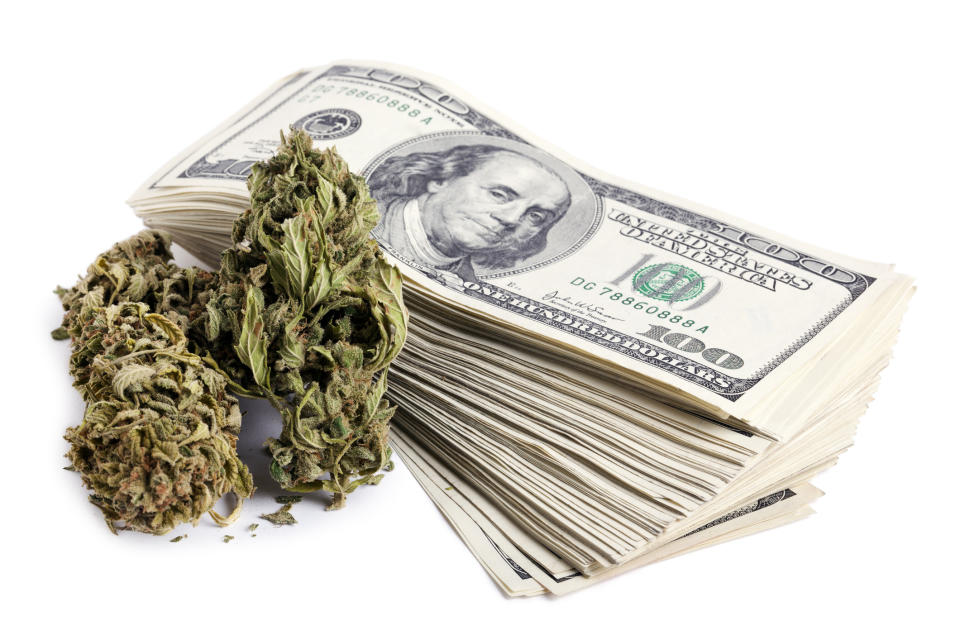3 Reasons Marijuana Stocks May Go Up in Smoke
Valuations across the nascent legal marijuana space have been exploding over the last five years. The core reason is that the steady march toward legalization across the globe is widely expected to result in marijuana becoming one of the most valuable industries in the entire world within a decade's time.
Keeping with this theme, Canopy Growth (NYSE: CGC) co-CEO Bruce Linton has suggested that legal cannabis could eventually morph into a $500 billion industry. His estimate implies that sales of marijuana and marijuana-derived products will rise at a staggering compound annual growth of rate of around 35% for the next 10 years.

Image Source: Getty Images.
But there are three common-sense reasons to think that the cannabis market might fall well short of these lofty projections.
1. Dried flower prices could crash
Quebec-based HEXO (NYSEMKT: HEXO) is among the few cannabis-oriented companies that has been truly up front about the state of the rapidly evolving marijuana space. Specifically, the company has openly admitted that up to 80% of the entire industry will likely be controlled by only a handful of entities within a few years.
There are two overarching issues that are likely to drive a widespread consolidation phase across the industry soon. First, the Canadian legal marijuana market should experience a supply glut in no more than two years. And if other major Western markets fail to open up in a timely manner to absorb this overproduction, dried flower prices will undoubtedly crash in Canada. In turn, smaller companies like HEXO will either have to merge with their peers to remain solvent, or move deeper into less-competitive niches to make a living (more on this later).
Second, the legalization of marijuana at the federal level in the United States may not be the boon to the industry that many are predicting right now. Growing marijuana at home is relatively easy and often more cost-effective than going to a legal retailer. Many Americans may also choose to grow at home in order to keep their cannabis habit out of the public purview.
The key point is that dried flower prices may have already reached their high-water mark in Canada and in states that permit the sale of cannabis. Therefore, many of these Canadian cannabis companies could struggle to turn a profit on a consistent basis -- even if America does green-light recreational use nationwide.
2. Edibles are set to disappoint
There's a very good reason that the first major deals in this space revolved around cannabis-infused drinks. HEXO, for instance, paired up with Molson-Coors to develop a line of nonalcoholic cannabis drinks through a joint venture called Truss, and Canopy Growth signed a major partnering deal with Constellation Brands to do the same last year.
The underlying reason is that the cannabis-infused beverage market is probably going to be one of the few areas where companies can actually establish a competitive moat. Consumers can't easily replicate these products, even if they have access to boatloads of cheap, homegrown weed.
But cannabis-infused candies, confections, and even full-on meals present no such barrier for the most part. As a result, a healthy proportion of cannabis enthusiasts may end up simply making their own edibles -- instead of paying a premium at retail outlets -- once federal prohibition ends in the United States. If so, billions of dollars in projected annual sales would fail to materialize from this key market segment.
3. Intellectual property may not matter
Medical marijuana is widely expected to be a crucial value driver for the industry. This notion, though, is arguably based on an extremely shaky premise.
Top players in the field are gearing up for trials of a range of medical marijuana products in the coming years. By doing so, these companies hope to build a competitive moat through intellectual property rights.
Unfortunately, cannabis companies may not be able to borrow from big pharma's playbook so easily. Patients will likely have easy access to cannabis strains that closely mimic the Food and Drug Administration-approved versions and that cost significantly less. There are already thousands of cannabis varieties covering a wide spectrum of tetrahydrocannabinol to cannabidiol ratios. A patent isn't going to solve this fundamental problem.
The one potential exception is the rare cannabinoid product series being developed by Cronos Group (NASDAQ: CRON) and Ginkgo Bioworks. If successful, Cronos and Ginkgo would have a unique product portfolio that can't be easily replicated or imitated. But there's no guarantee that Cronos' rare cannabinoid venture will prove fruitful -- underscoring the high degree of uncertainty surrounding this fledgling space in general.
Conclusions
Pot stocks have been soaring based on the assumption that the industry will grow at record-breaking levels over the next decade. But there are fairly solid reasons to think that these growth estimates may be overly optimistic.
The biggest problem is that the main product categories -- outside of the cannabis-infused beverage segment -- all have exceedingly weak competitive moats due to marijuana's underlying biology. And at some point, this fundamental problem will start to show up in quarterly earnings reports across the industry, perhaps marking the end of the market's love affair with all things marijuana.
More From The Motley Fool
George Budwell has no position in any of the stocks mentioned. The Motley Fool owns shares of Molson Coors Brewing. The Motley Fool recommends Constellation Brands and HEXO. The Motley Fool has a disclosure policy.

 Yahoo Finance
Yahoo Finance 